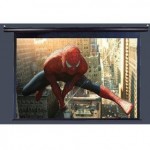
The beauty and probably the best benefit that a home theater system can offer is the experience of watching your favorite sports channels, movies and shows right in your own home. Larger than life entertainment can be yours as one of the major parts of a home theater system is the wide home theater screen. Some may say that using a projector to transmit the images to wall is the same as watching a game in a home theater screen but they most probably do not value image clarity and definition. There are so many brands around the world that have their own version of the home theater screen but there are just four basic types of theater screens that you need to know about.
The first type is the permanent screen and this option is for those who do not need to remodel or reconfigure their home theater systems. As permanent screens go, once they are mounted on a wall or a ceiling, they cannot be removed in a flash. However, permanent home theater screens can easily hide wires and connection devices so having them would lend any room a more polished and organized look.
Portable screen are not as expensive as the permanent screen and they are often used in classrooms where one can move it from one area to another with ease. It is budget-friendly and comes in smaller sizes as well.
Just like portable screens, manual-pull down home theater screens are also affordable and the sizes are flexible as well. This option is recommended for those who do not have enough space for a bigger sized screen in their living rooms or offices.
The most expensive type of home theater projection screen is the electric home theater screen. This is the most expensive option and also has the most complicated process for installation and maintenance. However, this is the most professional-looking in the group.
So for those who are in the planning on purchasing their own home theater systems, remember that the screen is an integral part of that package but the market allows you to select one that is appropriate for your budget and preference. Remember as well that the type of material and the kind of finish a home theater screen has affects the quality of the images that will be produced. As of now, there is matte white, gray or silver and beaded glass finishes for home theater screens. The last one gives crisp pictures and is able to showcase bright and vivid colors better than the others.
source: http://portablescreen.amdatablog.com/2010/08/29/ideal-screens-for-your-home-theater/
